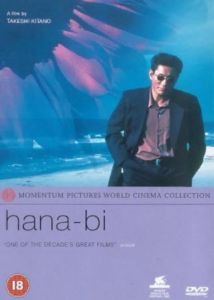#219
Seen It:
Yes
| 'Beat' Takeshi Kitano | |
| Kayoko Kishimoto |
| Director | 'Beat' Takeshi Kitano |
Kitano himself plays weary Tokyo cop Nishi, an impassive-faced detective in hock to yakuza mobsters, toughened by a career in violence (at one point he takes out an attacker's eye with a chopstick, an assault so swiftly edited one barely has time to register it). Nishi's Achilles-heel is his love for his wife Miyuki (Kayoko Kishimoto) who is dying of cancer, following their late daughter to the grave. When Nishi leaves a stakeout to attend to her in hospital, a colleague, Horibe (Ren Osugi) is paralysed in the ensuing shootout. Nishi, guilt-stricken, goes on the run with Miyuki, taking her to beauty spots to enjoy simple pleasures like kite-flying and picnics before she dies, although the yakuza are never far behind. Meanwhile, Horibe takes up painting, and discovers in the process a calming new vocation (the na&239;ve, disturbing and strangely beautiful images are by Kitano himself, painted after he had his own near-fatal experience in a motorcycle accident).
The cumulative effect is a profoundly moving and enigmatic movie, one that discreetly withholds many of the narrative crutches--backstory, motivation--you would expect from a conventional Hollywood movie with the same story. It's not surprising Kitano is so drawn to characters teeming with contradictions, given that his own career seems so bi-polar on paper: he started out a television presenting clown, and his move into glowering policiers represented an image volte-face as surprising to Japanese audiences as it would be if Dale Winton had started making Scorsese-style gangster movies. His comic sensibility shines through in spots in Hana-Bi, even more so in the broad comedy Kikujiro. Considered by many critics Kitano's best film, Hana-Bi^'s power is augmented by Hideo Yamamoto's lapidary cinematography, and Jo Hisaishi's lush, string-laden score. --Leslie Felperin
|
|
||||||||||||||||||
